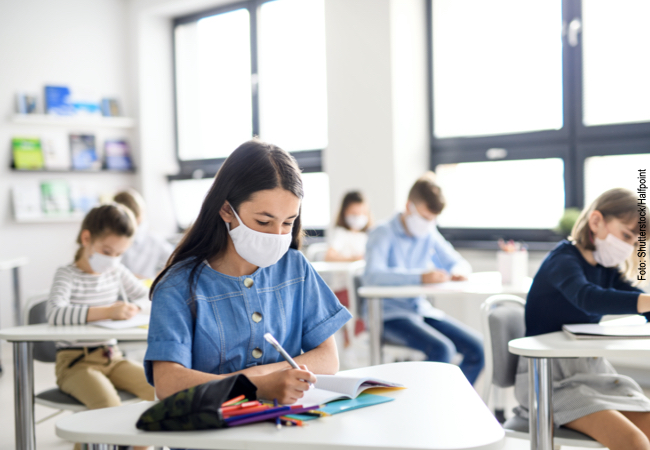
Atmospheric researchers from Goethe University have demonstrated that air purifiers with a class H13 filter (HEPA) can lower aerosol concentration in a classroom by 90 percent within 30 minutes. Because this significantly reduces the risk of airborne infection with SARS-CoV-2, the scientists recommend placing such air purifiers in classrooms. In most cases, students and teachers did not find the noise made by the purifier disturbing. The study is now available as a preprint, prior to appearing in a scientific journal.
The most dangerous route to an infection with SARS-CoV-2 is via the air: For example, when infected persons sneeze or cough, they catapult relatively large droplets which, however, sink to the ground within a radius of two metres. Important are also aerosols, much smaller droplets, which we emit when speaking or breathing. Studies show that infectious SARS-CoV-2 pathogens can still be detected in such aerosols over three hours after emission and several metres away from an infected person. The fluid in such aerosol particles evaporates quickly, making them smaller and able to disperse in a room within a few minutes.
Together with his team, Joachim Curtius, Professor for Experimental Atmospheric Research at Goethe University, tested four air purifiers in a classroom with 27 students and their teachers over a period of a week. The purifiers had a simple prefilter for coarse dust particles and fluff as well as HEPA and active carbon filters. Together, the filters processed between 760 and 1,460 m3 of air per hour. Apart from aerosol load, the researchers also measured the volume of fine dust particles and CO2 concentration and analysed the noise levels caused by the device. The result: Half an hour after switching it on, the air purifiers had removed 90 percent of the aerosols from the air.
Professor Curtius explains: “On the basis of our measurement data, we’ve calculated a model that allows the following estimate: An air purifier lowers the amount of aerosols to such a considerable degree that the risk of being infected by a highly contagious person, a superspreader, is greatly reduced. That’s why we’re recommending that schools use HEPA air purifiers this winter with a sufficiently high air flow rate.”
Noise measurements and a survey among students and teachers revealed that in most cases the noise made by the air purifier was not considered disturbing, provided that the appliance was not running at the highest level.
The researchers also measured that the air purifier – apart from lowering the risk of infection –additionally reduced allergens and fine dust particles (PM10). Joachim Curtius: “An air filter does not, however, replace opening the window at regular intervals, which is important for decreasing CO2 concentration in the room. Our measurements in the classrooms showed that levels often exceeded the recommended limits. Here, we recommend installing CO2 sensors so that students and teachers can monitor this themselves.”
Publication: Joachim Curtius, Manuel Granzin, Jann Schrod: Testing mobile air purifiers in a school classroom: Reducing the airborne transmission risk for SARS‐CoV‐2. Preprint: medRxiv 2020.10.02.20205633; doi: https://doi.org/10.1101/2020.10.02.20205633







